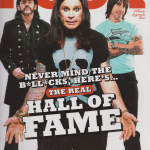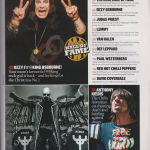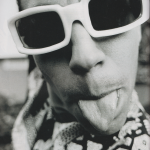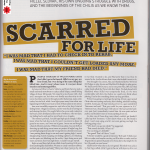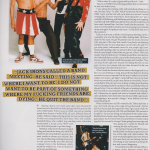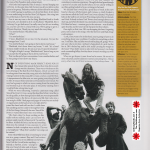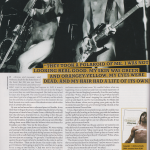IN HIS NEW AUTOBIOGRAPHY SCAR TISSUE, ANTHONY KIEDIS, FRONTMAN OF THE RED HOT CHILI PEPPERS, RECOUNTS HIS REMARKABLE LIFE STORY. IN THIS EXCLUSIVE EXTRACT, KIEDIS WRITES CANDIDLY ABOUT THE DEATH OF BANDMATE HILLEL SLOVAK, HIS OWN ONGOING STRUGGLE WITH DRUGS, AND THE BEGINNINGS OF THE CHILIS AS WE KNOW THEM.
SCARRED FOR LIFE
“I WAS MAD THAT I HAD TO CHECK INTO REHAB, I WAS MAD THAT I COULDN’T GET LOADED ANY MORE, I WAS MAD THAT MY FRIEND HAD DIED.”
Key to characters/ locations in story
Hillel: Hillel Slovak, original Chills guitarist.
lone: lone Skye, a beautiful young actress Chills bassist Flea met when he had a part in the science fiction movie, Stranded. Flea introduced her to Kiedis and, at age 16, she became the singer’s girlfriend. lone is the daughter of folk singer Donovan.
Puerto Vallarta: Mexican holiday hotspot.
Jack Irons: Original Chilis; drummer.
Lindy: Lindy Goetz worked in promotion at MCA and Mercury, and managed the Ohio Players one of Kiedis’s favourite groups. He became The Red Hot Chili Peppers’ manager in 1984.
Bob Forrest: Lead vocalist and lyricist with Thelonious Monster, an all-star collection of LA scenesters and musicians formed in 1986.
PEOPLE THOUGHT IT WAS IN POOR TASTE that I didn’t go to the funeral. Hillel was my guy, my best friend, but I was dying of the same thing that killed him. And it wasn’t about taste. It was just about insanity and unmanageability.
So lone and I flew to Puerto Vallarta, and from there we took a small outboard motorboat to a place called Yelapa, a small fishing village of about 100 people. We stayed in a nice house with a bed and a mosquito net, but there was hardly any electricity in the town. I lay there and went through another fucked-up, nasty, cold-turkey heroin kick, while I was light-years away from what was happening in Hollywood. I just turned off that station in my mind.
Ione was incredibly supportive, and after a few days I started feeling better. I began to exercise, and we went back to having sex and sharing this love. We caught fish in the ocean and cooked on the beach, and I developed a false sense of wellness. After ten days, my hiding had to end, and we went back to Los Angeles.
The minute I got back, I couldn’t get high quick enough. I didn’t know what the fuck else to do. By now I was down to about 10 grand to my name, and I was out of game. I went out and bought a bunch of heroin and coke. While Ione was asleep, I was on the floor shooting up and doing some inane art project all night long. But something had gone drastically wrong with my chemistry, because I was putting these drugs in me and wasn’t getting high, I wasn’t disappearing, wasn’t escaping, not feeling euphoric, not blocking out the pain, not blocking out the reality. I kept doing more and more and more, but I was right there. I couldn’t escape myself.
Right around then, Jack Irons called a band meeting. He’d never done anything like that before. We met on Lindy’s modest sailboat, and Jack sat us down and said: “This is not where I want to be. I do not want to be part of something where my fucking friends are dying.” He quit the band. And we understood.
Lindy was probably thinking, “What’s going to happen here? The guitar player’s dead, the drummer’s quitting, the singer’s hanging by a fucking thread. What happens now?” But Flea and I did not plan on stopping playing music together. It wasn’t out of lack of respect; it was out of respect. This was something that Hillel had helped build, and we were going to keep on building it, which was weird, because I was in no great mental shape. But I knew that it was what I wanted to do, and Flea knew that it was what he wanted to do. And Jack knew that it was what he didn’t want to do. Even though I was a mess, Flea and I hunkered down. We hired DH Peligro to play drums and Blackbird McKnight to play guitar. We had known DH for years, and at one point Flea, DH and I had a joke band called the Three Little Butt Hairs. We had played with Blackbird when Hillel was temporarily fired, so we were comfortable with him. But before we could even think about playing, I had to do something about my drug problem.
When I was going to meetings that spring, I’d met a guy named Chris who was a young and crazy, skirt-chasing, mischief-making, sensible, funny guy. He had introduced me to a guy named Bob Timmons and said, “This guy could be your sponsor in AA.” Timmons was a bearded guy with tattoos who had a pretty hard-core past, but I immediately trusted him. He was quiet and not pushy, and he didn’t seem to want anything from me.
So after one of those drug runs when I couldn’t get loaded, I called up Bob Timmons. “I don’t know what to do. My friend is dead. I can’t stop using, and it’s not even getting me high. I’m fucking going crazy.”
“Why don’t you go into rehab?” he suggested.
“That sounds horrible. What is it?”
“For one thing, it’s $10,000.”
“Ten grand! That’s all I have,” I said.
“I think it would be a good investment,” Bob said. “I think your life is at stake, and maybe one day you’ll be able to make another 10 grand if you spend 10 grand now. If you don’t, that might be the last 10 grand you ever know.” I didn’t know what else to do, so I agreed. The rehab was a place in Van Nuys called ASAP. I got in the car with Ione to drive out there, and I was so infuriated that I was trying to drive the car into the tarmac. I zigzagged all the way down Van Nuys, into oncoming traffic, and Ione was cowering in the passenger seat. I was mad that I had to check in to rehab, I was mad that I couldn’t get loaded any more, I was mad that my friend had died. We got there, and I checked in, and they took a Polaroid of me. I was not looking real good. My skin was green and orangey-yellow, my eyes were dead, and my hair had a life of its own. Then I was assigned a room. And a roommate. I was sharing a damn room with some other crazy bastard. He turned out to be this kid from Palm Springs who became my first sober rehab buddy. When you go to rehab, you end up meeting people from dozens of walks of life, all races, different financial realities, different religious backgrounds, but you end up loving all of them and seeing yourself in all of them. There was a female basketball player who couldn’t stop smoking crack, a Brazilian businessman, a doctor, and a SWAT team cop who busted people to get their drugs.
I settled in, and it wasn’t that bad. I stopped hating and started just being. My whole life, I had been the most defensive person you’d meet, unable to tolerate any criticism. But now I started listening and being. lone came to visit, and we broke the rules and had conjugal visits in the bathroom, which meant the world to me. I was so in need of some love and affection.
About two weeks into my time there, Bob Timmons came to visit. He’d seen that I had avoided going through the grief of Hillel’s death, so he told me that he was going to take me out on a day pass. We drove to the Jewish section of Forest Lawn Cemetery and wandered around until we found Hillel’s gravesite. There was a humble plaque in the grass, not even a tombstone.
The inscription was something simple like: ‘Hillel Slovak. Devoted son, brother, friend, musician.’
I was sitting there with Bob, saying: “Yep, okay, there he is. I guess we did that. Can we get out of here now?”
“No, I don’t think we should leave quite yet,” Bob said. “I’m going to take a walk. Why don’t you do me a favour and talk to Hillel end tell him how you feel about him dying? And why don’t you also make him a promise right now that you’re not going to put another needle in your arm and that you’re not going to drink and use?”
“Talk to what? It’s a plot of grass with a rock on it,” I said.
“Just act as if Hillel is here listening and have that conversation,” he said, and walked away.
I was sitting there feeling really awkward about talking to no one. But then I said, “Yo, Slim” which was the way I’d always greet Hillel. And it was like this wall came down in a second. I started weeping like I’d never wept before. From that point on, I was a waterfall of blabbering and blubbering and crying and coughing. I had this talk with Hillel and told him how much I loved him and how much I missed him. And then I made him the promise. “I’m clean. I’m in this rehab. I promise you I’m not going to put a needle in my arm again. I’m going to stay clean.” I cried all the way out of that cemetery.
Early on in my stay at rehab, we had a group meeting, run by a counsellor who was this big semi biker-looking dude. He’d been clean for five years. He got 30 patients into the room, everyone who was part of the class that month. Everybody was listening intently, because we were all giving it our best shot. He said: “I’ve got some pretty unfortunate news for you people right now. Statistically speaking, only one person in this room is going to stay clean for any length of time after you get out of here. That’s just usually what it boils down to.” I looked around that room and saw the basketball player, and the cop, and the businessman, and the doctor, and the criminal, and all these people, and I was like: “They can all go home right now, because I’m taking that slot. So you guys can save your money and your time, because I’m the one who’s going to be sober from now on.”
When I made the decision that no matter what happened in my life, I was not drinking or using, this gorilla that had been beating me down for years evaporated. By the time I walked out of rehab, I didn’t even want to get high. I turned off that voice in my head, which was wonderful, except it was almost too wonderful. I wasn’t compelled by that pain any more to keep working toward getting better and putting myself in a position where I could help someone else get better. I was so relieved of the pain of wanting to get high that I was able to coast and skate a little bit. I still went to meetings, and I showed up on panels and went to hospitals and talked to other alcoholics, but I didn’t dive into this incredible opportunity of instigating a true psychic change. I went halfway and then started backing off.
When I checked into ASAP, I wanted to die. Thirty days later, it was: “Let’s rock. Let’s go write songs. Let’s go be a band.” And we did. Flea was excited and supportive when I got out of rehab. We went right into rehearsals with DH and Blackbird. DH seemed to fit right in — he was fun-loving and absolutely lived to play music. Blackbird had a harder time fitting in. He was a uniquely talented guitar player, but he’d never been in a band where everyone rocked together. He was used to George Clinton giving him some tape and then going into a studio by himself and working for days on his parts.
We had been friends with DH for years, but Blackbird was harder to get close to. He was a little older and a little kookier. The more we played together, the more obvious it became that it was not clicking. Our idea of working on new material was always the jam, and it wasn’t happening.
Around that time, DH introduced Flea to a young guitar phenom named John Frusciante. John was a Chili Peppers fanatic who had been going to our concerts since he was 16. In fact, I had met John before Flea did. Around the time ‘Uplift’ [‘The Uplift Mofo Party Plan’ album, released in March 1988] came out, we were playing a big show at Perkins Palace in Pasadena. I was still struggling with my addiction, and I had to do a little bit of smack before the show, to get right. I drove to the gig and parked a few blocks away and walked through a park adjacent to the venue to find a place to shoot up. Just then, two fresh-faced kids walked up to me and gushed: “Oh my God. Anthony. We just want to say hi. We’re huge fins of the band.”
I chatted with them for a while, and then I walked across the park and sat down on the first staircase I could find and cooked up some dope. Then I looked up and saw that I was shooting up on the steps of the Pasadena police department.
After John had impressed Flea so much, I started hanging out with him. At the same time, Bob Forrest was all over John to play guitar in his group, Thelonious Monster. John told me he was going over to Bob’s garage to audition, so I drove him there. In my mind, he was auditioning for the Red Hot Chili Peppers. One song into his performance, I knew this was our guy.
Now it was my turn to do the firing. Blackbird lived in South Central LA, so I decided to do it on the phone. “Blackbird, this is Anthony. I’ve got bad news. I’m really sorry, but it’s not working out, and we can’t be in a band with you. We’re going to go in a different direction. Thank you very much for everything.”
“You motherfucker,” Blackbird said.
“What?” “You motherfucker.”
“C’mon, Blackbird, it’s not me. It’s the situation. I’m just the messenger here,” I said.
“You motherfucker. I am going to burn down your house.”
“Blackbird, don’t burn down my house,” I said. “It’s a band decision. It didn’t work out. It’s not us or you. It’s just the situation.”
“All right, all right. I accept,” Blackbird said. “Just so long as you can accept that I’m going to burn down your house.”
That was the end of our conversation. I was a motherfucker, and he was going to burn down my house.
NOT EVERYTHING MADE PERFECT SENSE FOR US the minute John joined the band. But what did instantly change was the chemistry. There was a wholeness to the love of being in The Red Hot Chili Peppers, which we hadn’t felt for a long time. Here was this young man who had dedicated every waking moment in his young life to music, and you could feel that. As inexperienced as John was, we were getting everything he had to offer. It was just better chemistry. DH and John were friends. We now had a group in which we were coming from the same place and wanted to go to the same place. It was pretty exciting, but it would still take a long time to gel.
While we were rehearsing, I started a cautionary song called ‘Knock Me Down. It was a song that described what it was like to be a drug addict, to have that ego and to think you were impenetrable and impervious to the forces of nature and life. But it also was a love song for Hillel. I had pages and pages of verses but no melody or organisation. John had come to me right after he joined the band and told me that I could show him anything and we could write together. One of the first things I showed John was ‘Knock Me Down’. I warned him that it was very verbose.
“Oh, that’s okay. I’ve been working on this really verbose melody, and I can see how it’s going to apply exactly to these words,” he said. He sat there, studied the lyrics, and started smushing them into his melody. It was uncanny. In a few minutes, he had a complete verse melody. This was a real epiphany: “Okay, here’s another way songs can be written.”
Even when Hillel was there, everything we wrote was in a group context. Flea and I had written songs together, but it was different on the bass. Now I felt that I could write anything — a melody, a rhythm, a lyric — and go to this new friend of mine and sit down, and when we left that session, we’d have a song. I felt like anything was possible with this kid. I could show him my most sentimental writings, and he didn’t stop to judge them once. There was no moment when he read the lyrics to see if he liked them or if they were something he wanted to do. Whatever I’d written had to be a song. Now I didn’t have to second-guess myself or be afraid to show something or try something new, which opened up the avenue for writing songs and making cool music.
John and I started to slowly but surely become the kind of friends who would spend every single day together and then go home and call each other to say good night before going to bed. And when we woke up, it was: “Good morning, what are we doing today?” After a while we didn’t go anywhere or do anything without doing it together, which is a rare and valuable but sometimes too intense experience. Though John had gone through a period of cocaine and alcohol abuse, he was clearly willing to sacrifice getting loaded to focus on being in the band.
We decided that it would be a good idea to break in the new band at obscure, off-the-beaten-path venues, so Lindy booked a tour that we called the Turd Town Tour. It was a disaster. We played holes in the wall in cow towns in Wyoming and northern Colorado and Utah. Nobody in these Turd Towns cared enough about us to show up, and when they did, it was a real rodeo crowd. Unfortunately, DH, bless his heart — sweetest guy in the universe — was drinking quite heavily, and he wasn’t at his sharpest for these shows.
One night on that tour, DH was dropping the beat, forgetting parts, not so clear on the songs. After the show, he and I had a huge confrontation.
“Look, if you want to be in this band, you’re going to have to do something about your condition. It’s either do something or bow out,” I told him. Flea and John were both backing off, going: “We’re not sure what to do here. Anthony’s being kind of a jerk, but the fact is, DH is fucked up, and he isn’t really carrying his weight in the band.” They didn’t want to side with me because I was being such a teetotaling killjoy, but they knew it wasn’t working out with DH either.
When we got home, it went from bad to worse. He started to miss rehearsals, and his addiction started consuming him. Almost every other time we’d fired someone, it had always been obvious and necessary, and without a doubt for the betterment of the band. But DH was our friend whom we loved and cared about and didn’t want to see anything bad happen to. Still, it wasn’t salvageable. Unluckily for Flea, it was his turn to do the firing. It was worse than we could have imagined. Flea had to stay in bed for days after firing DH. The only beautiful thing about it was, years later, I got to be a huge part of DH’s sobriety and his rebirth into the universe as a human, because from the moment he was fired, he went on a crash course of deceleration into a whole other level of unbelievable abuse.
By now we had moved into a rehearsal space in Glendale. It was there that we began the process of auditioning drummers. During the process, a friend of ours, Denise Zoom, called up Flea and told him that she had a drummer for us. According to her, this guy Chad Smith was the best drummer she’d ever heard, and he ate drums for breakfast. Anytime someone calls you up out of the blue talking about some dildo from the Midwest who eats drums for breakfast, you’re like: “Save me the time, please.”
But we let this guy come down and audition. We were waiting and waiting for him to show up, and he was late. I went outside to see if anyone was there, and I spied this big lummox walking down the street with a really bad Guns N’ Roses hairdo and some clothes that were just not screaming: “I’ve got style.” I had already decided against the guy, based on how he looked, but he came in and we were all business. “There are the drums. Get ready to play. You’ve got 10 minutes. We’re going to jam for five, and then we’re going to try a song or two for five.” Chad was not in the least bit intimidated by all this attitude we were giving him. Every other poor bastard who had sat down at the drums would look over at Flea, who would launch into an aggressive, hard-core, slapping funk-rock bass line, and the drummer would fall over himself trying to follow. Flea would wash them away with his intensity.
Flea started playing something hard, complicated, fast, and awkward to see if the guy could follow. Chad instantly not only matched him but started leading him and taking him for a ride. He over-aggressed Flea, and did it with finesse, and did it some more and some more and some more. We couldn’t believe what was happening. I was so turned around from my initial impression of this guy that I started laughing hysterically. Now Flea was looking at him like: “Whoa, what do I do? Where do I go? What the hell’s happening here?” Chad wasn’t stopping for a second to let Flea catch up and figure it out. He was screaming like Art Blakey did behind the drums, when you’re getting your gusto up for the moment, because there was a lot of energy being released at that moment between Flea and him.
It was a big eruption of sound and energy, and all I could do was laugh hysterically, howling at this fucking guy with the bandanna and the puffy hairspray hair and the bad Venice Beach muscleman shorts, thinking how funny it was that the goofiest guy we’d ever seen blew all of us away right in our own rehearsal studio. It was genius, and everyone loved it.
We all knew that Chad was the guy, and now we wanted to see what his level of commitment was. We also wanted him to change his look. We said to him: “Okay, you’re good. You can be in the band if you shave your head today. Show up later at Canter’s with your head shaved, and you have the job.” Chad said: “Whoa, whoa, a shaved head. I don’t know.”
“The choice is yours. Shave your head and be in the band. Don’t shave your head and don’t be in the band.” And we went to Canter’s and waited for him. He showed up with the same stupid hair.
“Dude, do you want this job or not?” we asked.
“Yeah, I’m going to play in the band, but I’m keeping the hair,” he insisted, and we conceded. We realised that anybody who was bold enough to stand his ground in the face of all that pressure was not going to be a bitch. Later on, we found out that the real reason he didn’t want to shave his head was because his hair was receding and he was hiding that behind the bandanna. Either way, it was another important day in our history, because now we had a drummer who was reliable and an awesome person to jam with. Now we could get down to work. ■
Why Red Hot Chili Peppers should be in the Hall Of Fame
Sales: More than 40 million albums worldwide.
Critical acclaim: The Chills developed from a bunch of LA high-school friends in 1983 into world-beating grunge-funk-punk freaks. With an early dictum of rocking all but naked, the band were almost as well known for their sock-it-to-me antics as for their groove-laden, spicy rock. Once the Chills put on more than just a well-placed stocking and offered up only their naked souls, critics and mainstream audiences alike embraced them with open arms.
Influence: The Chills broke all the rock rules when they got legendary funkmeister George Clinton to produce their second album. ‘Freaky Styley’ in 1985. Third album ‘The Uplift Mofo Party Plan’ consolidated the Chilis’position at the forefront of the burgeoning funk-metal explosion and they never looked back, influencing a whole generation of rap/rock bands from Faith No More onwards. The Chilis are now one of Americas most entertaining and biggest-selling bands, while still retaining their ‘alternative’ aura.

